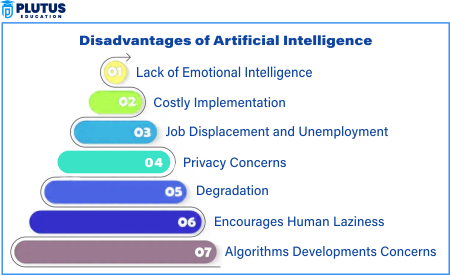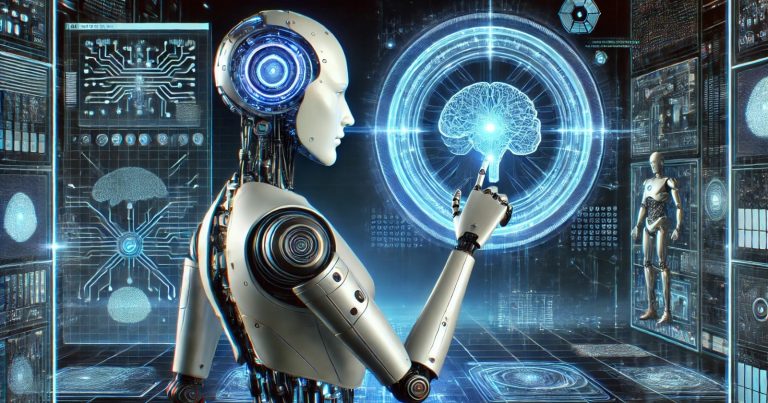Artificial intelligence (AI) now touches almost every part of life, including our industries, our day-to-day activities and even our thoughts. However, as with any major technological breakthrough, AI has its own disadvantages. Some disadvantages of artificial intelligence are job displacement, algorithmic bias, data privacy concerns, high implementation costs, etc. So, while the potential is far-reaching, so are the challenges and disadvantages associated with AI. AI Technology: Artificial Intelligence (AI) is a rapidly evolving transformative technology that is influencing every facet of our daily lives and revolutionising infinite industries. As such, with the evolution of AI: it is important to know its advantages and disadvantages.
What is Artificial Intelligence?
Artificial intelligence (AI) refers to any type of machine or computer software that can do what seems like human work. For instance, these tasks can range from learning, problem-solving, understanding natural language, and even sensing the environment. AI systems use data to recognise patterns and make decisions just as a human brain would.
These are just a few practical applications for the theory of artificial intelligence. Companies, universities, hospitals, and factories use AI daily to improve performance, eliminate errors and save time. AI is the foundation of a new generation of computing, which creates value for people and businesses. For example, Optical Character Recognition (OCR) uses AI image analysis to extract text and data from images and documents; it can transform unstructured content into business-ready structured data and unlock customer’s actual needs.
Disadvantages of Artificial Intelligence
With all these benefits, it would be ideal to start implementing AI for your business immediately! But it’s also wise to weigh the risks of taking such a dramatic step. AI adoption has several advantages but disadvantages include implementation cost and degradation over time.

Lack of Emotional Intelligence
AI’s next disadvantage is that it lacks emotional intelligence, which is the ability to recognise and manage your own emotion or feel for someone else and manage interpersonal relationships judiciously, and empathetically.
AI might be able to recognise certain emotional triggers and respond in a set way, but it has neither empathy nor the ability to understand the nuances of human emotion. Finding these limitations manifests palpable harm to them in job domains requiring emotional sensitivity (counseling, human resources, and so on), or wherever interpersonal interactions are the most important factors.
Costly Implementation
Possibly the most significant and glaring disadvantage of bringing in AI is that creating AI can be very expensive. The price varies depending on precisely what you need AI to ask. One estimate claims that the costs of a complete, fully working AI solution for most companies ranged from $20,000 to the millions.
The expense cancels out in the long run after the AI is in full swing and ready to assist with easing the workflow. But the initial expense can be daunting, if not prohibitively so.
Job Displacement and Unemployment
One of the most pressing disadvantages of artificial intelligence is its impact on jobs. As AI takes over tasks traditionally performed by humans, entire professions are at risk. Roles in manufacturing, customer service, and even certain types of white-collar jobs are being automated, leading to job loss and economic uncertainty for many workers. AI may increase productivity, but the social cost of displaced jobs can’t be overlooked.
Privacy Concerns
AI systems often require vast amounts of data to function effectively, which can lead to significant privacy concerns. Personal data collection, storage, and analysis can be intrusive, exposing sensitive information without individuals’ consent.
AI-driven surveillance systems and data mining practices can erode personal privacy, leading to potential misuse of data by corporations, governments, or cybercriminals. Additionally, there is a risk of data breaches and leaks, which can compromise personal and financial information, leading to identity theft and other forms of exploitation.
Degradation
This may not be as obvious of a downside as the ones cited above. But machines generally degrade over time. For example, if AI is installed into a machine on an assembly line, eventually, the parts of the machine will start to wear. And unless the AI has a self-repairing function, it will eventually break.
Likewise, AI can become outdated if not trained to learn and regularly evaluated by human data scientists. The model and training data used to create the AI will eventually be old and obsolete, meaning that the AI trained will also be retrained or programmed to learn and improve on its own.
Encourages Human Laziness
The growing dependency of humans on AI to handle everything from washing dishes to making important decisions can make humans lazy. As AI systems begin to perform more tasks than humans traditionally did, people may stop studying and learning as heavily, becoming overly dependent upon technology.
Over-reliance on this can reduce critical thinking and problem-solving skills: They give responses after analysing data, which can be referred to without dispute, even if the verdict is incorrect or the answer is false. In turn, this could result in a less competent labour force over time.
Algorithms Developments Concerns
We can thus compare the concerns around the pace and direction of technological development with regard to the rapid development of AI algorithms. Algorithms could be created and implemented more quickly than regulatory frameworks, and ethical guidelines can lag behind.
This results in unforeseen outcomes, including but not limited to risks related to the misutilization of AI technologies, absence of accountability, and inadequate protections against harmful use cases. Furthermore, because many AI algorithms are proprietary, transparency and public scrutiny are limited, making it difficult to ensure their fairness, accuracy, and overall social effect.
Advantages of Artificial Intelligence
AI is revolutionizing the way humans work, learn and live. It enables machines to reason and respond like a human. AI saves time, increases accuracy and provides better services in many industries. Here are five of the top benefits of AI in daily life and business.
Faster Decision Making
It uses AI to sort through billions of data points in seconds to help make fast and intelligent decisions. It doesn’t run out of steam or need time off like people. AI tools help businesses make real-time decisions on the best options available, such as approving loans, setting prices or detecting fraud. It saves time and helps enhance productivity.
Increased Efficiency
AI should provide answers quicker, with fewer errors, than humans can. It can run 24/7 without requiring breaks. Many companies use AI to perform straightforward, repetitive jobs, like responding to customer queries or sorting when emails arrive. This enables human workers to do more essential work and enhances overall efficiency.
Better Accuracy
AI systems use rules and data to execute tasks with great precision. In areas such as health care or banking, A.I. can catch small mistakes that people might overlook: Doctors use A.I. to diagnose diseases early from scans; banks use A.I. to detect fraud. It enhances safety and trust.
Cost Saving
AI cuts out manual work and can save costs thus. For instance, businesses employ AI chatbots rather than pay for many customer service representatives. Automation also reduces the risk of errors, which saves money on fixes. Eventually, this results in significant savings for businesses all while hitting growth targets quicker.
Personalised Experiences
AI examines customer behavior to provide recommendations. E-commerce websites employ AI to suggest products based on your search history. Streaming apps recommend shows you might enjoy. Users feel they are valued and their experience gets better. It is also used by companies to establish good relationships with customers.
Relevance to ACCA Syllabus
Emerging technologies and digital transformation, including Artificial Intelligence (AI), are topics within ACCA’s Strategic Business Leader (SBL) and Audit and Assurance (AA) papers. Though AI improves audit quality and financial reporting, students must be able to critically reflect on the limitations. Some of them are ethical concerns, loss of jobs, data security concerns, lack of human intervention, etc.
Disadvantages of Artificial Intelligence ACCA Questions
Q1: A big worry of the use of AI in audit processes is:
A) Increased paperwork
B) Loss of independence
C) Automation bias: excessive reliance on automated systems at the expense of human expertise
D) Higher taxation
Ans: C) Actual negligence by blindly trusting automated systems without expert intervention
Q2: What ethical issue commonly comes with AI use in finance?
A) Outdated standards
B) Inconsistent formatting
C) Transparency in decision-making is deficient
D) Overreliance on spreadsheets
Ans: C) The lack of transparent decision making
Q3: The use of AI systems can cause which type of organisational risk?
A) Decrease in compliance cost
B) Removal of audit trails
C) Loss of jobs in repetitive accounting positions
D) Higher marketing budgets
Ans: C) Job displacement in routine accounting roles
Q4: Which ACCA paper is likely to test risks associated with AI and digital tools?
A) Financial Reporting
B) Strategic Business Leader
C) Taxation
D) Corporate Law
Ans: B) Strategic Business Leader
Q5: What should auditors be careful about when applying AI-based analytics?
A) AI at all times superior then human
B) You have to do manual entry of data in case of AI
B) Context matters; AI may get it wrong
D) Denoising networks denoise sampled grooves.
Ans: C) There is no context behind the data to take input from AI
Relevance to US CMA Syllabus
In the global context, the use of artificial intelligence is covered in the US CMA Part 1: Financial Planning, Performance and Analytics with respect to the application of technology in financial processes. As AI increases prediction and efficiency, CMA candidates must also comprehend obstacles like data privacy issues, implementation expenses, or a lack of human insight in substantive analysis. Limitations of corporate big data: these limitations influence decision-making, whether the information reported is accurate, and whether they behave ethically.
Disadvantages of Artificial Intelligence CMA Questions
Q1: A major drawback of using AI in financial planning is:
A) More reliance on handwritten reports
B) High implementation and maintenance costs
C) Decrease in analytical power
D) Fewer data sources
Ans: B) High implementation and maintenance costs
Q2: In what way is AI able to provide better financial reporting?
A) It ignores small errors
Automating data entry and data analysis B)
C) It eliminates the necessity of accountants
D) It does not use accounting standards
Ans: B) It streamlines data entry and analysis
Q3: We mainly leverage AI in performance management by:
A) A mess with manual reports
B) Limiting data availability
C) Improving real-time decision-making
D) Replacing budgets
Answer: C) Improving real-time decision making
Q1: Perhaps one of the biggest downsides of free AI in financial planning is:
A) Handwritten reports, instead of more reliance on them
B) High implementation and maintenance costs
D) Improved analytical power
D) Fewer data sources
Ans: B) High implementation & maintenance costs
Q4: What is the impact of AI use on a CMA’s ethical responsibilities?
A) It makes compliance terribly simple
B) It eliminates internal controls requirement
C) It can make biased choices when the algorithms are not neutral
D) It guarantees decisions will always be correct
Ans: C) Algorithms may be biased if not neutral leading decisions to be biased
Q5: In which CMA part learn about AI applications and challenges?
A) Ad-Mediately: The Policies of Financial Management
B) financial Strength, performance and Analytics
C) Ethics Section
D) None
Ans: B) financial Strength, performance and Analytics
Relevance to CFA Syllabus
Use cases for artificial intelligence assist with investment analysis, risk modelling, and algorithmic trading. Candidates for the CFA learn how machine learning and AI influence financial markets, help with ESG investing, and improve efficiencies in valuation models.
Disadvantages of Artificial Intelligence CFA Questions
Q1: In terms of cost management, AI is most helpful by:
A) Reducing all costs to zero
B) Cost tracking and variance analysis automation
C) Doubling the workload
D) Ignoring indirect costs
Answer B) Automated tracking of costs and variance analysis
Q2: What AI capability enhances budgeting processes for business units?
A) Taking Off Financial Controls
B) Static spreadsheets
C) Modeling prediction, real-time updates
D) Manual input
Ans: C) Modeling prediction, real-time updates
Q5: CFA candidates must evaluate AI risks under which topic?
A) Financial Reporting
B) Economics
C) Ethics and Professional Standards
D) Corporate Governance
Ans: C) Ethics and Professional Standards
Q3: AI benefits performance measurement in the following ways:
A) Turn off performance dashboards
B) Ignoring KPIs
C) Offering dynamic insights into performance
D) Making reports slower
Ans: C) Dynamic performance insights
Q5 Responses: AI strengthens internal control by:
A) Making fraud easier
B) InAudible: Automating audit trails and risk alerts
C) Turning off system logs
D) They do not avoid segregation of duties.
Answer: B) Automate audit trails and risk alerts
Relevance to US CPA Syllabus
As a reminder, the US CPA Exam covers auditing, accounting, business environment and regulation. AI focuses on changing audit methodologies, plays a role in internal control systems, and provides better decision-making capabilities. AI benefits knowledge applies to CPA exam sections AUD, BEC, and FAR.
Disadvantages of Artificial Intelligence CPA Questions
Q1: How does Artificial Intelligence assist in audit planning?
A) Delays risk assessment
B) Data analysis for risk area identification automation
C) Replaces audit standards
D) Increases sampling error
Answer: B) automates data analysis in search of risk areas
Q2: In the FAR part, AI helps to account in:
A) Ignoring revenue
B) Provide automated financial reporting and reduction of errors
C) Write additional journal entries
D) Scapping disclosure requirement
Ans: A) Ignoring revenue
Q3: What CPA department focuses on emerging technologies such as AI?
A) AUD
B) FAR
C) REG
D) BEC
Answer: D) BEC
Q4. AI adds value to internal controls in the following ways:
A) Disabling system checks
B) Improving ongoing vigilance
C) Control activities avoidance
D) Simplifying fraud attempts
Ans: B) Improving ongoing vigilance
Q5: One of the AI benefits for tax advisory is:
A) Ignoring new laws
B) Real-time updates of the tax code and simulations
C) Delaying tax filing
D) Only serving large firms
Ans: B) Real-time updates of the tax code and simulations


